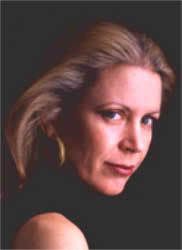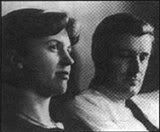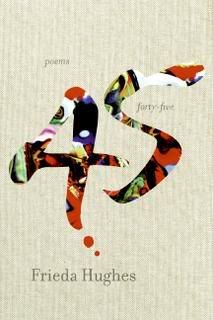And I loved Sylvia too


Picture credit: Frieda Hughes (l): Alimbaratur.com
Picture credit: Sylvia Plath & Ted Hughes(r): WilmaTheater.org

The one happy thing that draws me to John Baker's blog lies in the congeniality of his writings that stir up vivid memories of the odd unexpected passion.
A post may siren a bookish or cinematic experience to stumble out of the past in shadowy bewilderement, while nursing the flicker of a lamplight for a yet hopeful remembrance.
Then I am alerted to dangerous, even exciting moments when my influences may have turned a corner or picked up a dusty literary connection, never to be forgotten.
Such revelry for sentiment demanded a toast once more when Baker recently called attention in his post to this profile in Time which celebrated Frieda Hughes intense work of poetry, Forty-Five with a poignant and revealing interview on the poet's feelings towards the once-turbulent marriage of her now dead parents.
The poems that each capture a day of the accomplished poet and painter, Hughes's birthday, are silently moulded amongst other tragedies, around the famous suicide of her mother, the poetess, Sylvia Plath from a wounded marriage to England's former poet laureate, Ted Hughes. Frieda who lives in Perth, Australia, breaks her silence through her poetry after a terribly long spell, facing both emotional discord and triumph in equal succession.
Having read both her parents and having loved them enormously, these were some of my spontanous comments in Baker's blog, which encapsulate all at once my very true feelings as a lover of Plath's poetry...still dark and haunting after all this time and suddenly capturing me unawares.
...The first thing that came to mind when I looked at the photograph of Frieda was, of how much she resembled her mother…with that same easy grace and elegance.... am one of those readers who has stayed dutifully haunted by Plath’s life & with the exception of Ariel, the rest of her dark poetry, her autobiographical novella in The Bell Jar, her many photographs and also her ill-fated affair with Ted Hughes. ... Just one of the few times where poetry totally immersed me. I suppose that kind of passion never leaves. Tears started when I saw Frieda. And by God, doesn’t she have sad eyes...
It was a time in my life when I was reading intensely, having subsequently being lured from my choices and coddled into embracing the work of poets in England in the Sixties - the time of the Movement. I would read them only in the late '80s. I devoured Kingsley Amis with fervour and this spilt over into the somewhat secretive but highly educational aspects - which I dutifully hid from my mother and boyfriends - of the juicier Martin Amis's shocking fiction. Martin is the late Kingsley's son. I stayed mollified but wanting.
I read Martin's mother Elizabeth Jane Howard with easy comfort and a host too, of other women novelists that seemed to want to hold my hand and fly me into daring worlds of their own albeit irate husbands and welcomed lovers. I succumbed everytime.
Then there was Randall Jarrell, Philip Larkin, and of course the electrifying love affair between Plath and Hughes. I was also tossing up a fair bit of Dickens and Mrs. Elizabeth Gaskell at the time. All very gallant you may say.
But both the lives, biographies, and writings of Virginia Woolf and Sylvia Plath enveloped me with emotions so deep I thought I would collapse in agony from the sheer weight of them. I did not realise at the time that I would be bound to these ladies across the seas and years for life.
I was caught up by Plath's poetry and suicide in the same way as Woolf's. Their lives seemed unfinished, incomplete and forever swinging on balls of thread.
Plath commanded such a powerful influence, I marvelled at her genius but may have even lived her poems out in everyday life, having become inordinately depressed. Teary but enchanted if such a paradox may ever be justified.
Over the years, I felt incredibly sorry for Hughes. What remorse he must have felt over his wife's death. What secret thoughts when he remembered things in the quiet and the dark. What pain of a man's gaunt silence. It is so hard to wear masculine fortitude in public when all one may want to do is break down.
And so it went on and on...
Such are the sordid misadventures of love. One never forgets a broken diary, a torn letter or a teardrop kiss. One never forgets the unsuspecting rivulet of blood that hovers in the throes of an embrace.
And that is why too when I glimpsed the picture of an elegant Frieda, I thought at once, that this was poetry sculptured by both Plath and Hughes, though her parents would never catch the symphony or hear a finished ovation. Would never comprehend of another fragile beauty beyond that of the whispered word and an inherited strength beyond her own. And then tears started in my own eyes as it did all those years ago, even as I looked once more into hers.


<< Home